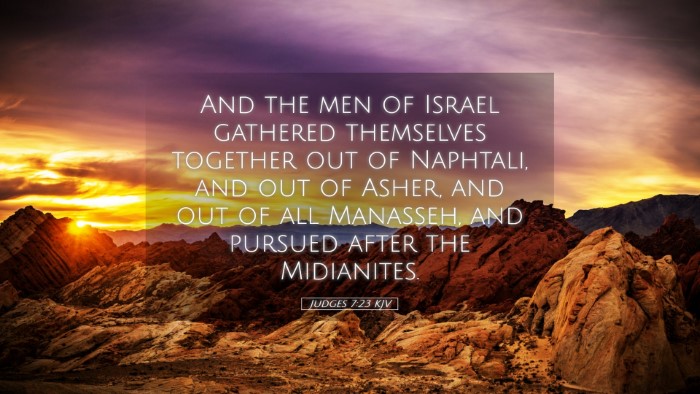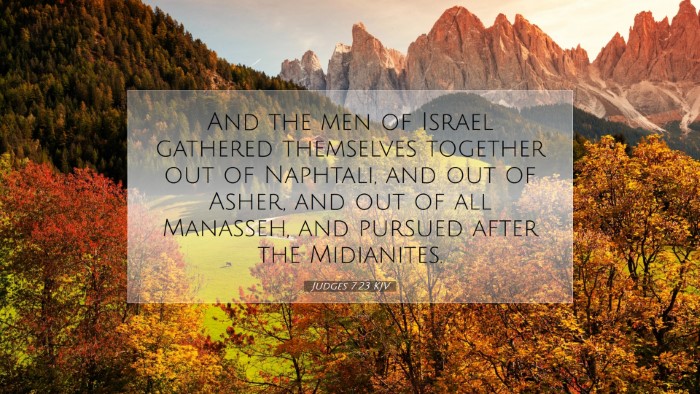Old Testament
Genesis Exodus Leviticus Numbers Deuteronomy Joshua Judges Ruth 1 Samuel 2 Samuel 1 Kings 2 Kings 1 Chronicles 2 Chronicles Ezra Nehemiah Esther Job Psalms Proverbs Ecclesiastes Song of Solomon Isaiah Jeremiah Lamentations Ezekiel Daniel Hosea Joel Amos Obadiah Jonah Micah Nahum Habakkuk Zephaniah Haggai Zechariah MalachiJudges 7:23
Judges 7:23 KJV
And the men of Israel gathered themselves together out of Naphtali, and out of Asher, and out of all Manasseh, and pursued after the Midianites.
Judges 7:23 Bible Commentary
Commentary on Judges 7:23
Judges 7:23 states, “And the men of Israel gathered themselves together out of Naphtali, and out of Asher, and out of all Manasseh, and pursued after the Midianites.” This verse encapsulates the decisive moment when the Israelites, under Gideon's command, rallied together to confront their oppressors. The reaction of the Israelites reflects a significant transformation and unification in their national identity and purpose.
Historical Context
This verse takes place during a tumultuous time for Israel, marked by oppression from the Midianites. The cyclical pattern of sin, oppression, repentance, and deliverance dominates this period. Gideon, chosen by God, represents an example of divinely appointed leadership, called to deliver the Israelites and restore their covenant relationship with God.
Public Domain Commentary Insights
Matthew Henry's Commentary
Matthew Henry observes that this verse illustrates the collective spirit among the tribes of Israel, highlighting the importance of unity in their mission against the Midianites. Henry notes that the tribes of Naphtali, Asher, and Manasseh willingly joined Gideon, showcasing their commitment to the cause of national deliverance. He emphasizes that this was not just a military campaign; it was a gathering of God’s people responding to a divine call.
Moreover, Henry points out the significance of the phrase “gathered themselves together,” suggesting that it indicates a voluntary response to God’s providence. This unity is a critical element in executing God’s will, reminding leaders of the necessity of cooperation in ministry for achieving God-directed ends.
Albert Barnes' Notes on the Bible
Albert Barnes elaborates on the participation of different tribes, stressing that this reflects a turning point for the nation of Israel. They were not only responding to Gideon’s call but also coming together as a unified front against a common enemy. Barnes interprets this involvement by the tribes as an act of faith, suggesting that they were galvanized by the previous miraculous signs God performed, which reassured them of divine favor.
Furthermore, Barnes draws attention to the significance of the geographic diversity of the tribes, noting that the act of gathering from various regions symbolizes a holistic national identity that transcends tribal divisions. Their collective action serves as a powerful lesson on the importance of shared mission and purpose in the body of believers.
Adam Clarke's Commentary
Adam Clarke reflects on the logistics of the gathering, indicating that the pursuit of the Midianites was a strategic operation, reflecting both military discipline and theological purpose. Clarke emphasizes that this pursuit served not only to defeat the enemy but also to establish the Lord’s sovereignty over Israel once again.
Clarke also highlights that the tribes' response to Gideon’s call reveals a fundamental dynamic of leadership and follower-ship within the scriptural narrative. The willingness of the men of Israel to join Gideon underscores the criteria for effective leadership, namely, the ability to inspire trust and faith among God’s people.
Theological Significance
Judges 7:23 offers rich theological insights that are paramount for understanding the dynamics of faith, community, and divine intervention.
- Unity and Cooperation: The gathering of different tribes highlights the importance of unity in achieving God’s purposes. In a contemporary context, this encourages the Church to pursue collaborative efforts in the face of spiritual and social challenges.
- Divine Call and Human Response: The Israelites' readiness to pursue the enemy reflects a profound truth: God not only calls individuals but also mobilizes communities in fulfilling His redemptive purposes.
- Leadership and Authority: Gideon stands as a model for leaders today, exemplifying how faith and divine calling can inspire collective action. His leadership reflects reliance on God’s guidance, which is crucial for any effective ministry.
- Faith in Action: The act of mobilizing troops against Midian illustrates that faith must lead to action. This principle is vital for believers who are called to respond to God’s leading actively.
Practical Applications
For pastors, students, theologians, and Bible scholars, Judges 7:23 serves as a microcosm of greater biblical themes. The following applications can be made:
- Encouragement of Unity: Pastors are encouraged to foster unity within their congregations, recognizing that collaborative ministry efforts are invaluable.
- Empowerment of Leaders: Training and empowering emerging leaders who demonstrate faith and capability can yield substantial fruit for the Kingdom of God.
- Faith in Community: Students and scholars can explore the dynamics of faith as a communal experience, emphasizing how collective faith leads to collective action.
- Strategic Planning: Understanding the strategies used by Gideon can inform modern church planning, helping leaders to align their actions with biblical principles.
Conclusion
Judges 7:23 encapsulates a pivotal moment of mobilization and collective resolve, inviting deeper reflection and action in contemporary settings. By analyzing the insights from renowned biblical commentators such as Matthew Henry, Albert Barnes, and Adam Clarke, readers gain a profound understanding of the verse's implications. The call for unity, the role of leadership, and the importance of action in faith are principles that resonate across the ages, providing meaningful lessons for both individual believers and the Church as a whole.


